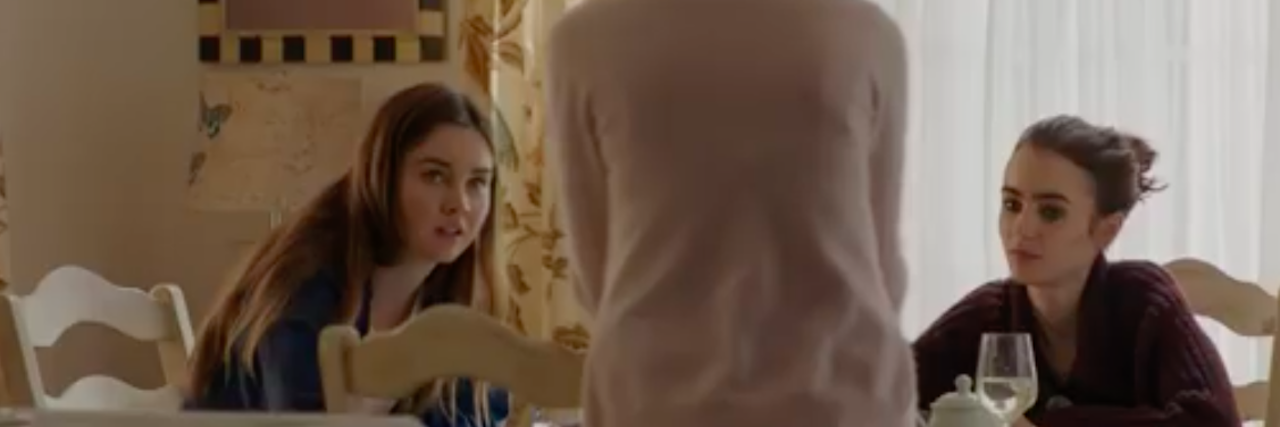A lot of people within the eating disorder community, I think, have heard about Netflix’s new movie, “To the Bone.” It is a movie that depicts the struggles Ellen, a 20-year-old young woman, and takes us on her recovery journey. While there was a lot of talk about it before it came out, I decided I would reserve my judgments until I had seen the entire film. After all, you can’t judge a book by its cover, and it can be hard to tell a lot about a film based on the trailer. The result of the film, however, was worse than I imagined.
While I can admit there is plenty the makers got right in regards to depicting a young person with anorexia: the behaviors, habits, calorie counting and over-exercising — there was so much I thought they got wrong in regards to eating disorders and eating disorder recovery as a whole.
One of the most frustrating parts for me was that Ellen had been to three other inpatient therapies that “didn’t work,” but the one that did was the one where she developed a love interest. It couldn’t have been because she found reasons for herself to get better. It couldn’t have been that she got better so her sister had a better role model, or she had the drive to get better so she could have a better life and could thrive. No, her inspiration was the boy in the group home.
I understand that it’s just a movie and it’s not supposed to be completely realistic, and they want to have a “heart warming” story in there, but I just feel frustrated that it had to be a love story.
When I went through recovery, I worked hard for my recovery. I worked hard on my recovery for myself. I worked hard on my recovery so I could have a life beyond my eating disorder. I worked hard on my recovery because I wanted to believe life could be about more than just food, calories and how much weight I could lose in a week. I worked hard because I wanted a future, because I wanted a life and I wanted to live it.
Yes I relapsed, and yes, we saw Ellen relapse. I think that’s important to show because it happens to everyone. I fell and I fell and I fell. And you know what, every time I got back up again. I got back up for my life.
I will be entirely honest, I was not expecting to see my story in this, because mine is not an anorexia story. I was hoping that maybe, just maybe, since they had such a diverse group of characters, they might show a little bit more of their stories. I was hoping that maybe they would show what it’s like to struggle with bulimia, beyond the one liner of, “Hey do you purge?” with the reply of, “No, I tried it, not my thing.” I understand they can’t put every disorder in one film, but they could have done more with it.
In light of this, I’m going to say what many other people are saying. If this is a story that you feel represents you and your struggles, that is awesome. I think it is so important that we are starting a conversation about eating disorders in general. However, from my own perspective, I feel like this is the narrative everyone already knows about eating disorders. The pretty, skinny white girl has an eating disorder — and that eating disorder is anorexia. She’s obviously underweight, because if she’s not, is she really anorexic? And this is coming from the pretty, skinny white girl who developed an eating disorder.
The problem with this narrative is that it can make people think this is the only struggle that matters — that this is the only real eating disorder — because with bulimia, “At least you’re eating, right?” Also with bulimia, you’re less likely to be underweight, so that must mean you are “healthy.” And of course, you have people with binge eating disorders who are so underrepresented because, “All they have to do is eat less, which is easy, right?”
I wish they would have had more diversity in “To the Bone.” Diversity meaning: more people of color, characters of different sexuality and different age. Eating disorders do not discriminate. They can affect anyone, of any race, ethnicity, sexuality, background or age.
If you feel like I do, that this is not a story which reflects your struggles, I assure you, your struggles are real and valid. Your eating disorder is real. Your story is real and you are entitled to get the help you need. You deserve to thrive in this life, just as much as anyone else. You deserve to feel well. Your eating disorder is not a joke. It is not you being overly dramatic. You are not taking away resources from people who “really need it.” You need those resources and deserve those resources just as much as anyone else does. You can get better and you will get better. But, it might not be easy. There might not be a person who “saves you.” You have to want it for yourself. You have to work hard for yourself. You can get better. You just have to work for it.
If you or someone you know is struggling with an eating disorder, you can call the National Eating Disorders Association Helpline at 1-800-931-2237.
We want to hear your story. Become a Mighty contributor here.
Screenshot via To the Bone

